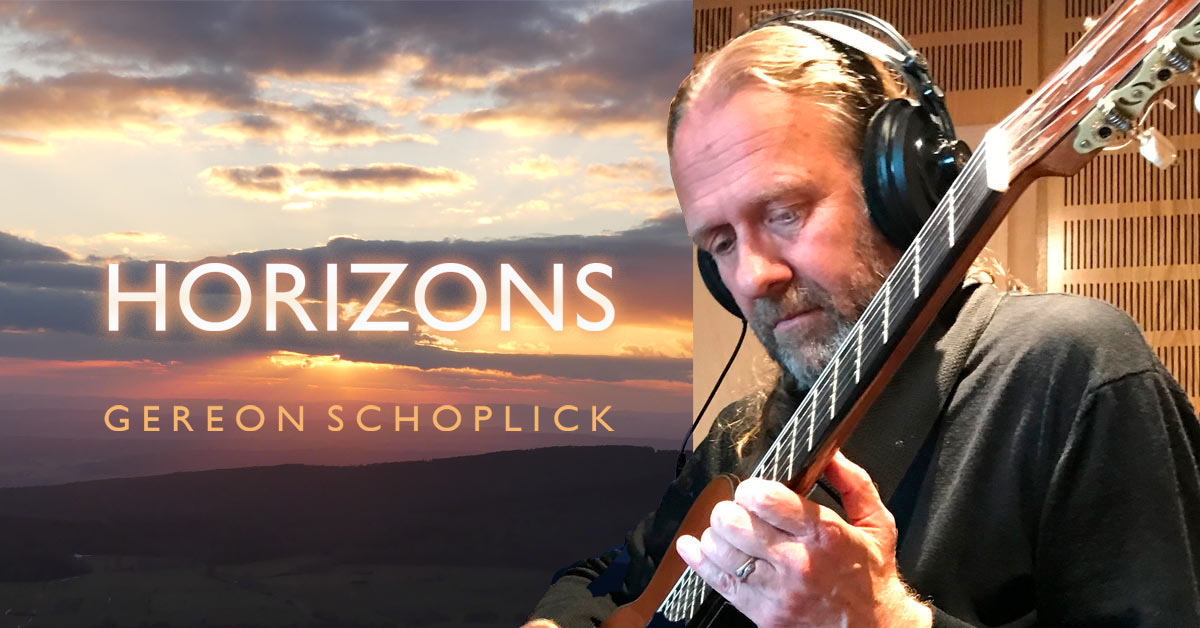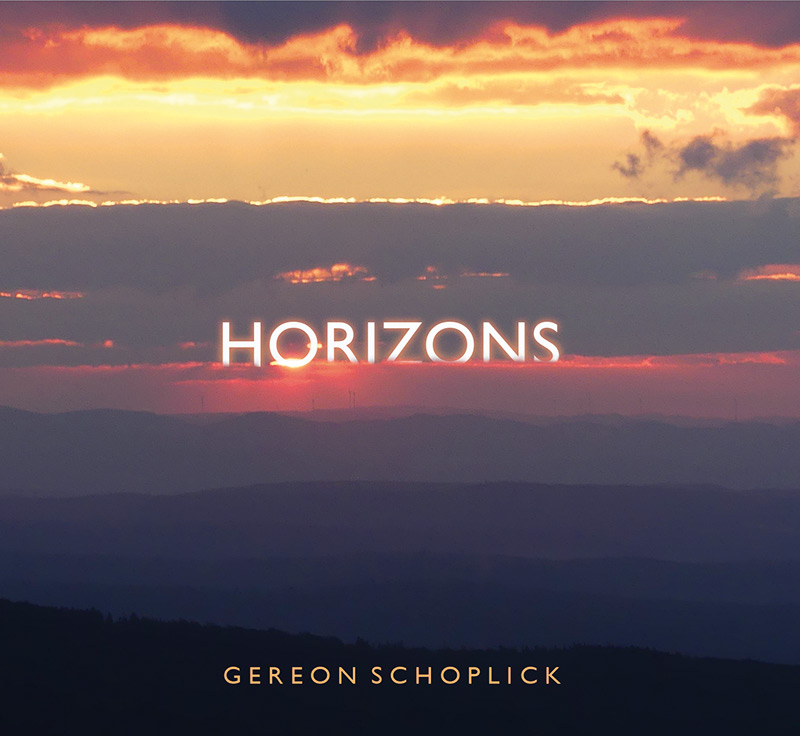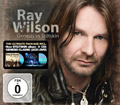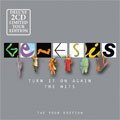


Preface
Fans are a strange kind of human species. They form clubs, wear T-shirts or jerseys or uniforms of their faves, hold events, dress up, recreate entire settings, create videos, work out competition games, or make music with other fans.
In this case, we have arrived at the topic of music. Of course, we are in a fan club that was founded in honour of a rock band and its (ex-) members. Yes, this case weighs heavily, because Gereon is a member of the sensational Ant Band and is responsible for wonderful guitar work. This "Ant" has now left the hill and presented a solo album.
Background
The musician is Gereon Schoplick, member of the Ant Band and musician of the legendary Anthony Phillips event in Welkers 2014. Although he grew up in an environment influenced by classical music (his father was a church musician), he only began to make music himself as a self-taught musician at the tender age of 21. He was influenced by Baden Powell, Ralph Towner, Robert Fripp (King Crimson), Jerry Garcia (Grateful Dead) and the Genesis guitarists. So it is not surprising that Gereon fell in love with the guitar. His musical spectrum ranges from jazz to rock, classical, folk and South American music. He has played in numerous bands, with many musicians and has already had a number of releases.
One of these musicians is the American singer Nicol Brüninghaus, with whom he recorded a joint album Colors of Peace. At the same time, in the same studio, this guitar album Horizons was created, a collection of his own compositions, as well as interpretations of pieces by his musical idols.
Artwork
 The CD comes in a cardboard sleeve with a gatefold cover. It is adorned with a photo of a landscape in the light of the setting sun, which fades into clouds. On the inside, the sun has set and the landscape is in grey gloom. The photos are by Gereon, artwork and layout by Tom Morgenstern (Ant Band). In the liner notes we find, among other things, a list of the string instruments Gereon used. On the left side of the inside cover, the following verses jump out at us:
The CD comes in a cardboard sleeve with a gatefold cover. It is adorned with a photo of a landscape in the light of the setting sun, which fades into clouds. On the inside, the sun has set and the landscape is in grey gloom. The photos are by Gereon, artwork and layout by Tom Morgenstern (Ant Band). In the liner notes we find, among other things, a list of the string instruments Gereon used. On the left side of the inside cover, the following verses jump out at us:
Guitarra de mi cariño
No hay nada que no comprendas
Eres el alma sonora
Que nos afirma en la tierra
Todo cabe en tu madero.
Guitar of my love
There's nothing you don't understand
You are the melodious soul
Affirming us on earth
Everything fits within your wood.
Thus we have found the intention of the album. Do we find music made with love?
The Tracks
Ever Tried (Gereon Schoplick):
The title of the track is derived from the poem by Samuel Beckett [i]. This little improvisation fills the room/ear with dark, threatening sounds reminiscent of an approaching thunderstorm on a summer evening. Tones floating through the ether delight with warm harmony. Is Gereon playing a bass? If not, how does he do it? He plays a guitar with seven courses, five double-string courses tuned in unison or an octave, plus two single-bass strings (one of which is lower than the lowest string on a normal guitar). Counting? Aha, we arrive at a 12-string, a custom-made instrument. Right from the start of the album it becomes clear that the artist has a soft spot for unusual instruments and sounds.
Cancion de Cuna (Leo Brouwer)
The basic mood of this often-recorded track is warm, relaxed, as if the storm had passed and a lukewarm summer night had arrived. The guitar playing is reminiscent of South American folklore with its emotional changes from dreamy crooning to nightmarish excitement, or from dance and joy to lament and sadness. No wonder, since the composer comes from Cuba [ii]. Do I hear Gereon's kinship with the acoustic Steve Hackett?
Manha de Carnaval (Luiz Bonfa)
A bossa nova! Almost everyone knows the melody. No wonder, because the song from the film Orfeo [iii] Negro has often been interpreted, e.g. with a jazz touch or even as a hit song. Here Gereon plays it beautifully on a 12-string. The sound of this unique guitar puts the listener in a melancholic mood that speaks of memory and expectation. Do we see a couple sitting opposite each other over a glass of wine? And each one lonely, closed in on himself, hoping that the other will overcome the distance? Well, we're not thinking of the story of Orpheus and Eurydice, are we? After all, the film tells the classical Greek story and relocates it to the carnival of Rio.
Vidala Dolorosa (Atahualpa Yupanqui):
Our South/Central American journey now leads to Argentina. Attentive listeners will have recognised that the above quotation comes from this unique guitarist and singer [iv]. He wrote the piece in exile in Paris, where he had fled from the military dictatorship. Gereon plays it heartbreakingly on a classical guitar. How sensitively he brings out forlornness, longing, loneliness. We can imagine the musician staring south through the window of his small Parisian flat, full of homesickness, while playing the beautiful melody on his guitar, lost in thought.
Euridice (Vinicius de Moraes, Baden Powell):
Brazil, a gentle, not so hot summer morning, the rainforest awakens, all the creatures begin their eternally recurring serenade in honour of the sunrise, a single bird pushes its way forward with a magical voice. Baden Powell [v] arranged the piece on his album Poema on Guitar. Gereon also intones the poem on his classical guitar. To the ears of this reviewer, he is very close to Steve Hackett and his acoustic pieces on Momentum and Tribute here. Perhaps Gereon takes a quieter, gentler approach. The reference to Greek myth is given for the second time with the title. The reviewer thinks of Kim Poors' book Amazonia Imagined.[vi]
For Absent Friends (Phil Lee):
The trip to the south comes to an end. Although it is not the Nursery Cryme classic of the same name, we move to England to the beautiful city of Canterbury. It has a music scene and style named after it. One of the bands there is called Gilgamesh [vii]. Phil Lee wrote the jazzy piece for them and their album debut. Now, after folk, bossa nova, etc., we have arrived at jazz. Gereon masters this subject as well, captivating with the weaving of colourful harmonies and joyful jazzy excursions.
Celio (Gereon Schoplick):
It becomes a little quieter again, gentler. The concert guitar is tenderly caressed. The piece reminiscent of Anthony Phillips (a declaration of love?) introduces a part with a total of three original compositions and one traditional piece. For the reviewer, a beautiful gem.
Mondrago Sunrise (Gereon Schoplick):
The title makes one think of the nature park in the east of Mallorca. Correct, that is where the piece was written. The listener is led a little astray. Is this not a duet? Has Gereon "superimposed" two classical guitars? It sounds as if a guitar playing the beautiful melody is accompanied by one playing the harmonies. No, it's an unusually tuned 12-string that thinks it's an orchestra and tempts Gereon into acrobatic finger exercises. Eh? The listener is also seduced, or rather abducted, into musical expanses beyond the horizon.
Kommet ihr Hirten (trad., arr. Gereon Schoplick)
A Christmas carol! But played on which instrument? A classical guitar, or a 12-string after all. No, it is a Waldzither [viii], known in Ireland as a bouzouki, belonging to the cittern family. With its round belly and narrow neck, the nine-stringed instrument is reminiscent of a fat guitar. New, minimalist moods are elicited from the familiar Christmas tune. A must for the musical selection on Christmas Eve. Gereon, in order to get a feeling for a new instrument, first plays Christmas carols on it. So it was obvious to include such a finger exercise on the album.
Lullabye (Gereon Schoplick):
A lullaby, played so softly, tenderly and floatingly on a classical guitar that you can hear how much a person is loved here. Heart-warming, as if it had fallen out of time. Anthony Phillips will also be touched by this short piece.
Uncle John's Band (Jerry Garcia)
Hey, we're back in America, this time with the Grateful Dead! The song describes the Deadheads' mood of optimism before live performances by their favourite band. This joyful anticipation, the curiosity, the happy exuberance is interpreted by Gereon in beautiful images with his classical guitar and can compete with the guitar god who died much too early [ix].
Great Dreams From Heaven (Joseph Spence, arr. Ry Cooder)
We are now treated to a swinging gospel hymn that invites us to dance. The American guitarist Ry Cooder arranged this piece. Gereon performs it congenially on his classical guitar.
Cinema Paradiso (Ennio Morricone)
Who doesn't know the wonderfully melting Love Theme from the film by Giuseppe Tornatore [x]? The original was composed for a large string orchestra and accordingly comes across as bombastic, almost kitschy. Gereon's version for classical guitar sensitively brings us closer to the beauty of the melody. The intimacy of the piece quietly shows us the admiration for cinema, for film. This is how guitar music must be in the ears of this reviewer: Paying homage to the magic of listening, creating timelessness in the intimate moment of listening. That has been achieved here. A highlight of the album.
Peace - A Theme (Robert Fripp)
Oh, Gereon interprets the opener of the second King Crimson album. This is the beginning of the Genesis block. King Crimson strongly influenced the musicians of Genesis. So this choice is understandable. One of the reviewer's favourite pieces is no problem for Gereon. A dream! The chords flow. The melody, beautifully sung by Greg Lake, is played in such a way that you don't miss the vocals. This is what the Robert Fripp needs to hear?
Study No. 1 in E Major (Excerpt) (Anthony Phillips):
It is a new recording, somewhat different from the version on A Light On The Hill. What did the reviewer write at the time?
This is the second sensation. The track has not yet been published by Ant on a recording. Only the sheet music published in the collection Six Pieces for Guitar is available. Gereon Schoplick attempts the short study for classical guitar with bravura.
Is there anything more to add? Perhaps only that this play and the work of Gereon are now no longer a sensation but have almost reached normality. Is there any greater praise?
Horizons (Steve Hackett)
The track that gives the album its title is a classic among Genesis fans, better known than the work of Anthony Phillips. It truly takes confidence to play and record it. Gereon justifiably has it! Listen, compare it to the version on Foxtrot or Bay of Kings! Do you find the differences? Reminiscent of Steve, Gereon plays his guitar, caresses it, plucks it fluently. A wonderful version, which is of course another highlight of the album.
Lute's Chorus (Anthony Phillips, Mike Rutherford)
Oh, it's beautiful! The Suite Henry - Portraits From Tudor Times from Anthony Phillip's album The Geese & The Ghost, of which the little theme is a part, is music for the desert island. Gereon conjures indescribable music not on a lute but on the classical guitar. Yes, the reviewer loves Anthony Phillips' music and is therefore perhaps biased, but the sounds make you float?
Field Of Eternity (Anthony Phillips)
Gereon finds the following words on one of his favourite tracks:
The wonderful harmonies and melodies make something resonate in my innermost being that I cannot put into words! Yes, the reviewer can only agree. What a dream it must be to be able to play this music that opens gates beyond the horizon! Unfortunately, the reviewer can only hear it, but that alone is enough to shed a tear - one! Field Of Eternity by Anthony Phillip's Private, Parts & Pieces album alone is worth buying the CD.
End Of The Season (Anthony Phillips)
The little wink of Anthony Phillips Private Parts & Pieces II is interpreted by Gereon on a 12-string. Is the attic haunted, are the mice clattering, chirping and nibbling? No, it's Gereon up there making music on his 12-string. A mischievous conclusion to the Genesis block.
Secret Room (Gereon Schoplick)
Warm, low tones bring the album to a close. But it is not the strangely tuned 12-string of the opener that whispers, but a mandocello. It comes from the mandolin family, is somewhat larger than the latter and tuned lower [xi]. Gereon elicits sounds from it that are reminiscent of the Middle Ages. Played by a troubadour in a forest glade (see the cover of The Geese & The Ghost album) to bewitch a fairy, or a nymph. The beautiful melody closes a wonderful album.
All in all:
The reviewer need only refer to the verses of Atahualpa Yupanqui quoted above and keep his mouth shut, right? The guitar is the melodious soul, yes, but only if the soul of the musician harmonises with it. That is what happens here. Gereon not only demonstrates an incredible playing skill, but also a deep sensitivity in the interpretation of the compositions and the understanding of foreign cultures. Thus, the album not only invites you to listen intensively, but also to discover the interpreted artists.
For the reviewer as a hi-fi freak, it remains to praise the extraordinary sound of the recordings. An unbelievable spatiality contributes to the listener having the feeling that Gereon is playing live in his/her living room.
Well done!
Post Script:
The reviewer begs the reader's indulgence for his "flowery" language. He can neither play an instrument nor does he know music theory.
So he has to choose his words in such a way that they do justice to the musical performance as much as possible.
He hopes, not least by buying the album, for approval!
Author: Thomas Jesse
Horizons is available on CD and digital on Bandcamp.




Package with live 2CD/DVD and new Stiltskin album. Available also as MP3 album.


Turn It On Again - The Hits brings all "short" milestones onto one double-album.